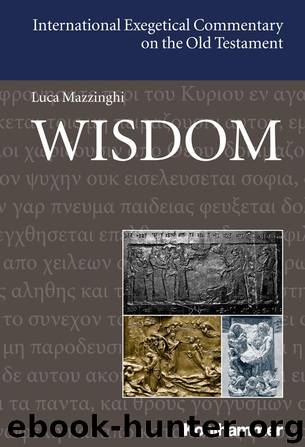Wisdom by Luca Mazzinghi

Author:Luca Mazzinghi [Luca Mazzinghi]
Language: eng
Format: epub
Publisher: Verlag W. Kohlhammer
Published: 2015-10-13T00:00:00+00:00
a’. 12:2: conclusion and summary (again ἁμαρτάνω, in 12:2b); the therapeutic purpose of God’s punitive action.
Wis 12:3-21 The second section comprises Wis 12:3-21 and has as its theme the divine moderation towards the Canaanites. 2 In this case too, we can detect a well-ordered structure with its centre in v. 12:
– 12:3-11 (nine verses with 21 stichs): the divine moderation towards the Canaanites. At the centre is the declaration of principle in v. 8a. Verses 3-7 are characterised by the inclusio γῆς–γῆ (3, 7b; cf. also the pronouns σου in 3 and παρὰ σοί in 7b) and describe the divine hatred of the Canaanites in a single, long sentence. In this long sentence the object stands at the head in 12:3, the participial construction beginning with μισήσας (12:4-6a) serves as the basis for the decision pronounced in the main clause (6b). The subordinate final statement (v. 7) describes the intention bound up with this decision.
Verses 8b-11 revolve around a new principle which is expressed in 10a and which takes up the theme of μετάνοια expressed in 11:23c. The expression κατὰ βραχύ is directly linked with 8c, while ἐδίδους is taken up again at the close of the pericope, in 11b. The theme of vv. 8b-11 is God’s therapeutic punishment.
– 12:12a-d represents the centre of this whole section and formulates a new fundamental principle through four rhetorical questions (τίς – ἢ τίς – τίς – ἢ τίς): no one can judge God’s action. Upon this follow another 22 stichs in nine verses (vv. 13-21).
– 12:13-18: the reasons for the divine moderation. At the centre of this little pericope, in 16a, there is a further declaration of principle. The power (ἰσχύς) and justice (δικαιοσύνη) of God are recalled. In 13-15, the basic theme is that of God’s justice (cf. 15a) whereas, in 16b-18, the theme is, rather, God’s power (ἰσχύν; ἰσχύος: 17a, 18b); cf. the repetition of δεσποζ- and of φειδ-, followed by an explicative γάρ (16b, 18ab). The introduction of the pronoun ἡμᾶς in 18b, referring to the Israelites, constitutes a hook with the following section which moves from the consideration of the divine action on the Canaanites to the consequences of this action for Israel.
– 12:19-21: the lessons of this moderation; summaries of preceding themes; cf. πατράσιν in 21b which takes up πατέρων in 6b and παίδων in 7a and 20a. The form ἔκρινας in 13b connects us directly with 21a, creating a real inclusion and making of v. 21 the true end of the pericope which opened in v. 13.
The text of 12:19-21 is structured according to a characteristic scheme: AB A’B’ CD E D’C’. 3 This thus causes 20a (C) and particularly 20c (E) to stand out, so underlining how the principle of divine mercy works both for God’s children and for God’s enemies. We note the repetition in this section of the terms of the declaration of principle in 12:10a: μετάνοιαν (19d); δούς … τόπον (20c).
Download
This site does not store any files on its server. We only index and link to content provided by other sites. Please contact the content providers to delete copyright contents if any and email us, we'll remove relevant links or contents immediately.
The David Story by Robert Alter(548)
The Book of Job by Harold S. Kushner(546)
1 and 2 Kings by Iain Provan(535)
The Book of Job: When Bad Things Happened to a Good Person by Kushner Harold S(527)
The Book of Psalms by Robert Alter(465)
HAMMER! by Barbara Hammer(459)
1 and 2 Chronicles by Frederick Mabie(452)
God and Sex by Michael Coogan(450)
The Message of Isaiah by Barry Webb(442)
Exploring Exodus: The Origins of Biblical Israel by Nahum M. Sarna(430)
Be Decisive (Jeremiah) by Warren W. Wiersbe(423)
The Everyday Torah: Weekly Reflections and Inspirations by Bradley Artson(416)
1 & 2 Kings (Understanding the Bible Commentary Series) by Provan Iain W(411)
Ecclesiastes, Song of Songs by Iain Provan(407)
Old Testament Commentary Survey by Longman III Tremper(382)
John Calvin's Commentaries On Genesis 1-23 by John Calvin(365)
1 and 2 Samuel (Zondervan Illustrated Bible Backgrounds Commentary) by V. Philips Long(358)
Joseph and the Way of Forgiveness by Stephen Mitchell(329)
Lamentations, Song of Songs by Wilma Bailey(311)
